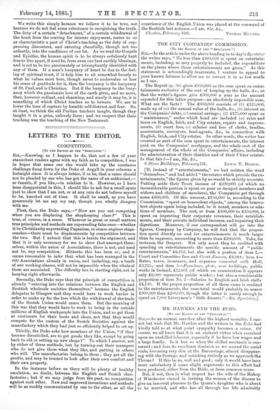LETTERS TO THE EDITOR.
COMPETITION.
[To THE EDITOR OF THE "SPECTATOR."] SIR,—Knowing, as I happen to do, that not a few of your staunchest readers agree with my faith as to competition, I was
in hopes that some one else would take up the courteous challenge flung down by the Duke of Argyll in your columns a fortnight since. It is always better, if so be, that a cause should not be pleaded by one who has got the name of an enthusiast,— or fanatic, if you like,—in relation to it. However, as I have been disappointed in this, I should like to ask for a small space just to show that I am not, or at any rate do not believe myself to be, knocked out of time. It shall be small, as you have generously let me say my say, though you wholly disagree with me.
First, then, the Duke says,—" How are you not competing when you are displacing the ehopkeeping class ?" This is true, of course, in a sense. Wherever in great or small matters true principles and methods are superseding false ones—whether it be Christianity superseding Paganism, or steam-engines stagecoaches—there must be displacements by competition between the two. But I submit that this is beside the argument, and that it is only necessary for me to show that amongst themselves, within the union of Associations, there is not, and need not be, any competition. Hitherto this has been so; and it seems reasonable to infer that what has been managed in the 600 Associations already in union, and including, say, a tenth of our working-classes, will not be impossible when the whole of them are associated. The difficulty lies in starting right, not in keeping right afterwards.
Secondly, the Duke says that the principle of competition is already "entering into the relations between the English and Scottish wholesale societies themselves," because the English delegates to Glasgow said they would have to work harder in order to make up for the loss which the withdrawal of the trade of the Scotch Union would cause them. But the meaning of this was that they would have to work to bring in the outside millions of English workpeople into the Union, and so get them as customers for their boots and shoes, not that they would compete for the custom of the Scotch Societies against the manufactory which they had just so efficiently helped to set up.
Thirdly, the Duke asks how members of the Union, " if they become dissatisfied, are to get goods they like, except by going back to old or setting up new shops ?" To which I answer, not by either of these methods, but by turning-out their managers who do not give them what they like, and putting in others who will. The manufactories belong to them ; they get all the profits, and may be trusted to look after their own comfort and their own property.
In the instance before us there will be plenty of healthy emulation, no doubt, between the English and Scotch shoefactories ; but if we may judge from the past, no competition against each other. New and improved inventions and methods will be as readily communicated by one to the other, as all the experience of the English Union was placed at the coremautl of the Scottish last autumn.—I am, Sir, &c.,
Cheater, February 10th. THOMAS HUGHES.


































 Previous page
Previous page